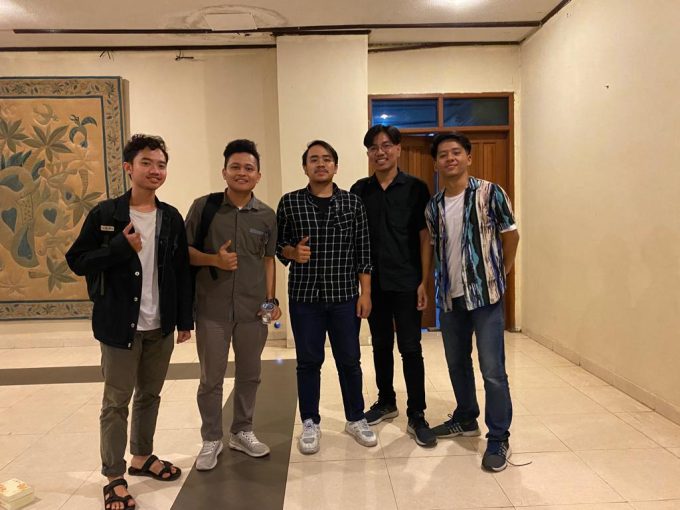
Yogyakarta, which is nicknamed the City of Students, has excellent quantity and quality of education. Many students make Yogyakarta a destination to continue their educational studies, including Batak youth. Continuing life with the aim of education in one of the big cities which is also known for its strong culture, requires Batak youth to adapt to new environments more quickly and effectively in various areas of life so that Batak youth are successful in achieving what they strive for. Problems such as cultural dissimilarity are a big challenge that must be resolved immediately with good adjustment by Batak youth, especially those who are migrating for the first time. Thus, knowledge from your hometown is needed to be able to survive in the overseas world.
Based on this adaptation problem, the UGM Student Creativity Team for Social and Humanities Research (PKM-RSH) recently conducted research. The team consisting of Geraldo Situmorang (Forestry 2020), Julian Dwi Efendi (History 2020), Fahri Reza (Literature 2021), Hendra Prasetya (Public Policy 2022), and Iqbal Sinulingga (Agricultural Industrial Technology 2022) has successfully researched the topic “Dalihan Na Tolu: Life Survival System for Overseas Batak People in the Toba Yogyakarta Batak Student Community.”
From the results of the research that has been carried out, it is revealed that the Dalihan Na Tolu philosophy, which is a kinship system, is capable of bringing change in the adjustment of Batak students overseas. The existence of clans is the basis for the system to bring students into the community, both inside and outside the campus. The existence of a community of Toba Batak students is an implication of the adaptation problems faced by Batak students plus interactions between Batak people who are overseas.
Dalihan Na Tolu is defined as three stoves consisting of Manat Mardongan Tubu, Somba Marhula-hula, and Elek Marboru. These three constitute the core trilogy which serves as the basic theme of Dalihan Na Tolu. Dalihan Na Tolu’s role in making it easier for Batak students to adapt to Yogyakarta is implemented with tarombo. Tarombo is a system formed on the principle of kinship which shows a person’s rights and obligations towards his family by underlining a person’s role and function in the family structure, namely through part speech (greeting). That way, students are taught how to behave, to whom, for what reasons, and not just limited to family structure.
The Dalihan Na Tolu system, which teaches social interaction in Batak culture, has an impact on the formation of Batak communities on and off campus. Several communities such as the Batak Student Community (Atma Jaya University Yogyakarta), Imbada (Duta Wacana University Yogyakarta), Sada Pardomuan (Sanata Dharma University Yogyakarta), and Marga Sumut (Gadjah Mada University) in Yogyakarta help students in social adaptation. Motivations for joining a community vary, and activities held by the community can help maintain Batak’s cultural heritage.
Outside campus, clan-based communities such as Situmorang and Parna as well as church youth groups also provide support and expand students’ social networks. However, there are several shifts from the Dalihan Na Tolu system, such as the use of the Batak language calling system which is limited to fellow Batak communities, and a decrease in understanding of the Partuturan system. Students felt embarrassed or lacked education in using the Batak language, and the traditional address system began to shift to using common language such as “Mas” and “Mbak.” This indicates a change in learning Batak culture among overseas students.
In implementing the Dalihan Na Tolu concept, there are two factors that influence Batak students in Yogyakarta. Internal factors are influenced by a lack of knowledge inherited from the closest family, a lack of concern for traditional traditions, a high curiosity about local culture, and a lack of participation in traditional events overseas. External factors are influenced by cultural differences between Toba Batak and Yogyakarta City, which are dominated by Javanese culture and other cultures. The diversity of students from various regions also contributes to a mix of cultures.
Thus, the Dalihan Na Tolu system and tarombo as its implementation help Batak students adapt. Batak clans and communities inside and outside campus become a forum that facilitates the adaptation process and allows students to build social relationships. However, the research results identified a shift in the application of Batak culture, especially in the use of the Batak language and the spoken system. Internal factors, such as a lack of knowledge inherited from the family, and external factors, such as the dominance of Javanese culture, influenced this change. In a deeper analysis, shifts in language use and speech indicate a cultural adjustment that occurs among Batak students in Yogyakarta. Although Dalihan Na Tolu remains the guide, its implementation can change according to the cultural environment faced.

